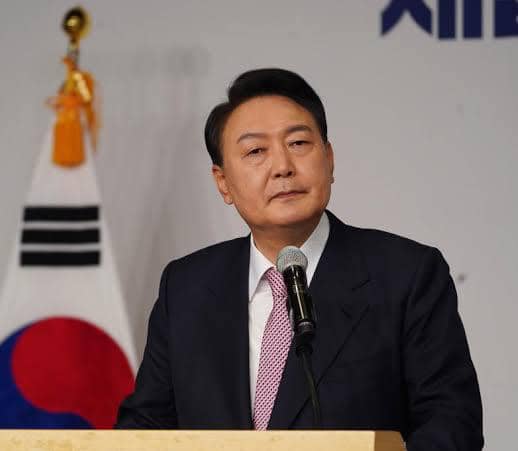South Korean President Yoon Suk-yeol seems set to survive an impeachment vote on Saturday, despite large-scale protests outside parliament calling for his removal.
His party’s lawmakers boycotted the vote, preventing the opposition from securing the necessary votes for his impeachment.
Yoon had sparked nationwide and international outrage by imposing martial law on Tuesday night, suspending civilian rule.
However, after significant backlash, including from lawmakers, he quickly reversed the decision.
The opposition parties, which control 192 of the 300 seats in parliament, filed the impeachment motion, which required 200 votes to pass.
Ahead of the vote, Yoon, 63, apologized for the turmoil caused by his actions but stopped short of resigning.
In a televised address, he acknowledged the public anxiety and inconvenience caused but said he would leave the decision on his future to his party.
“I sincerely apologize,” Yoon said, adding he would trust his party to handle the political situation and any potential measures, including his resignation.
Despite Yoon’s apology, his People Power Party (PPP) stuck to its position of blocking the impeachment.
Party leader, Han Dong-hoon, however, suggested that Yoon should step down to prevent further political instability.
“The president’s duties cannot be carried out under the current circumstances,” Han said. “An early resignation is inevitable.”
Had the motion passed, Yoon would have been temporarily suspended from his duties while the Constitutional Court reviewed the case.
But with most of the PPP’s lawmakers walking out of the chamber, the motion failed to meet the required quorum.
The decision is likely to anger the tens of thousands of South Koreans who have taken to the streets to demand Yoon’s resignation.
Opposition leader, Lee Jae-myung criticized Yoon’s comments as “disappointing,” pointing to widespread public anger and calling for Yoon’s immediate resignation or impeachment.
A recent opinion poll showed Yoon’s approval rating had dropped to a historic low of 13%, and many South Koreans, including retirees and housewives interviewed before the vote, expressed frustration with his leadership and demanded his resignation.
In addition to the political turmoil, police have launched an investigation into Yoon and other officials for alleged insurrection.
The martial law declaration included controversial orders to detain key political figures, leading to clashes between soldiers and parliament staffers, who barricaded themselves to block the military’s entrance.
Some lawmakers even had to climb over walls to access the parliamentary chamber and vote down Yoon’s decree.
The episode, which evoked memories of South Korea’s authoritarian past, has raised concerns internationally, with the U.S. State Department calling for the democratic process to be upheld.
Secretary of State Antony Blinken expressed his hope for a return to normalcy in the country’s political landscape.

















